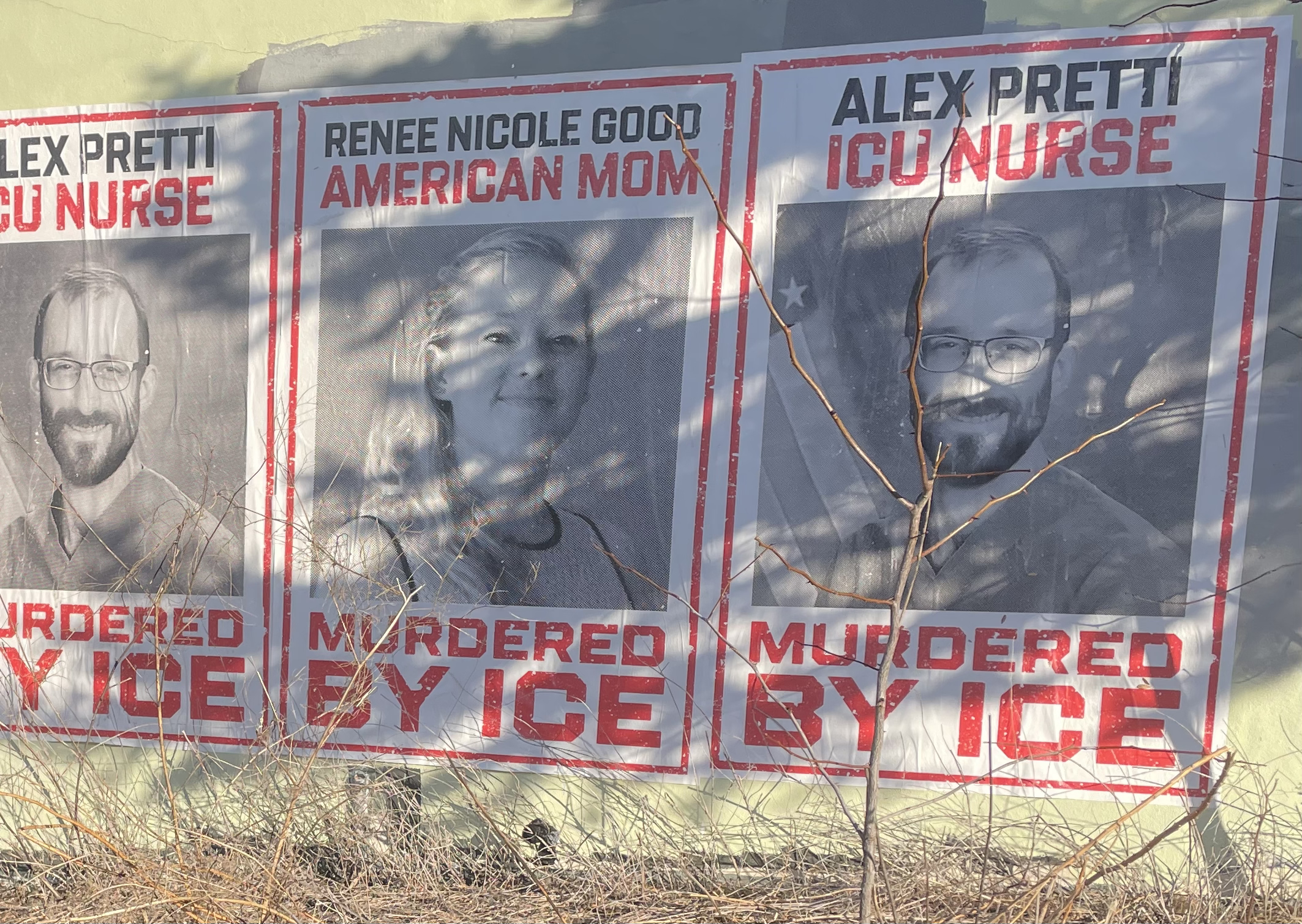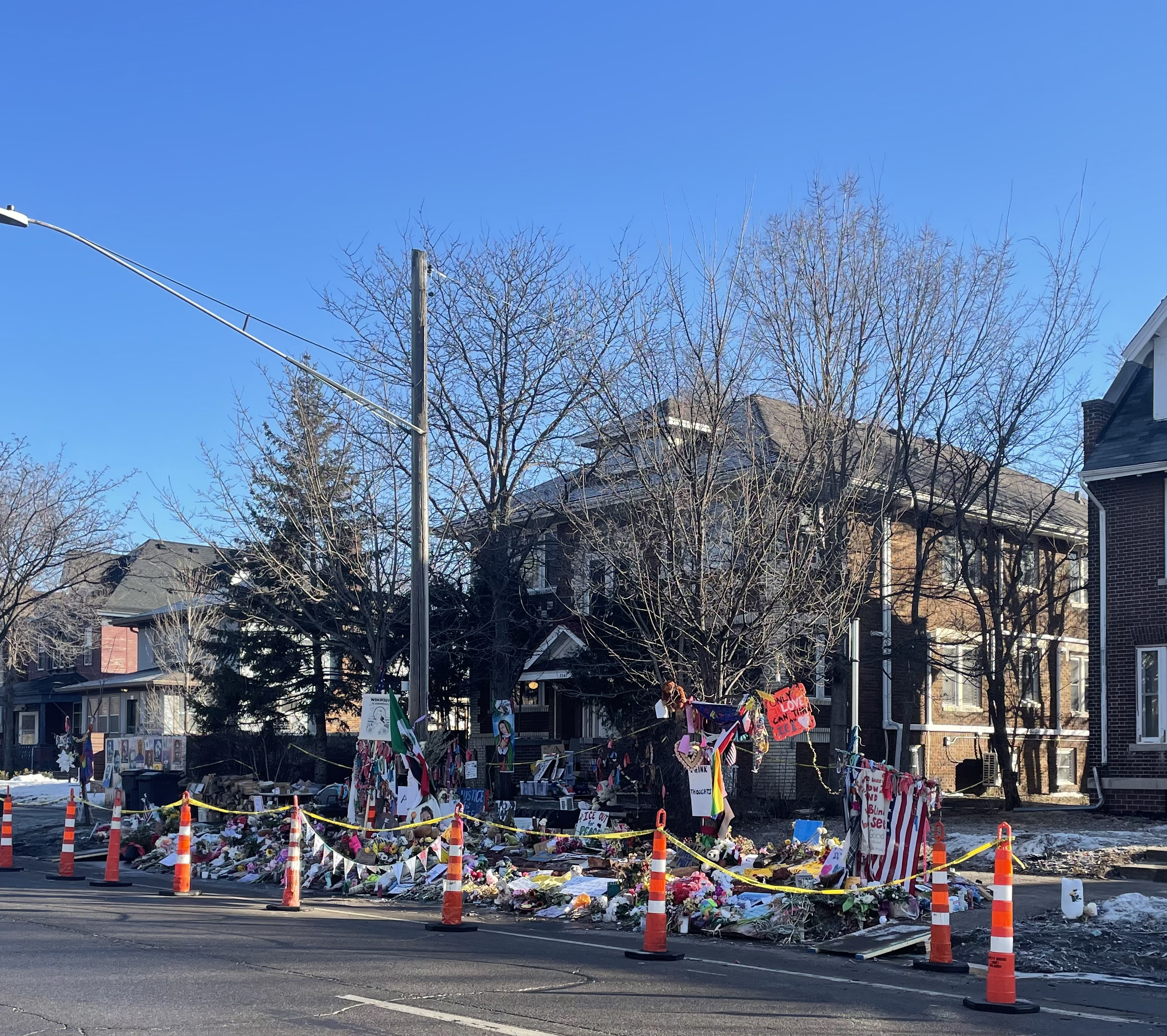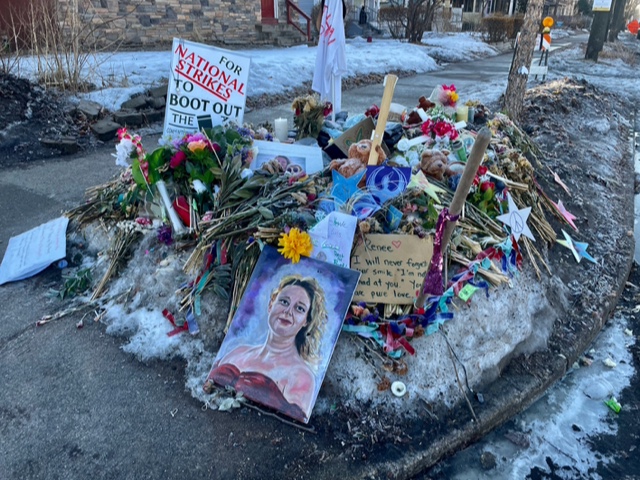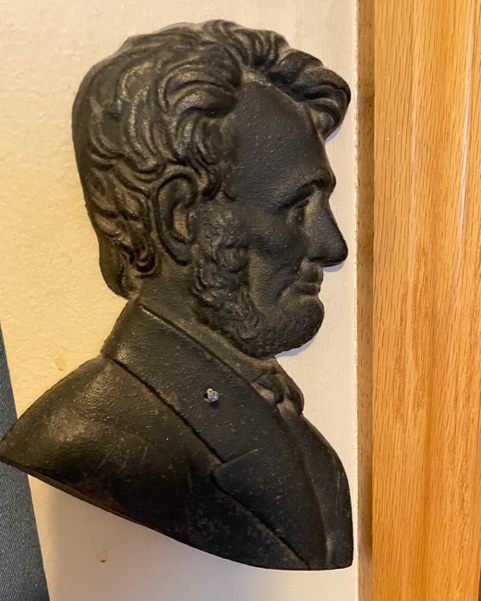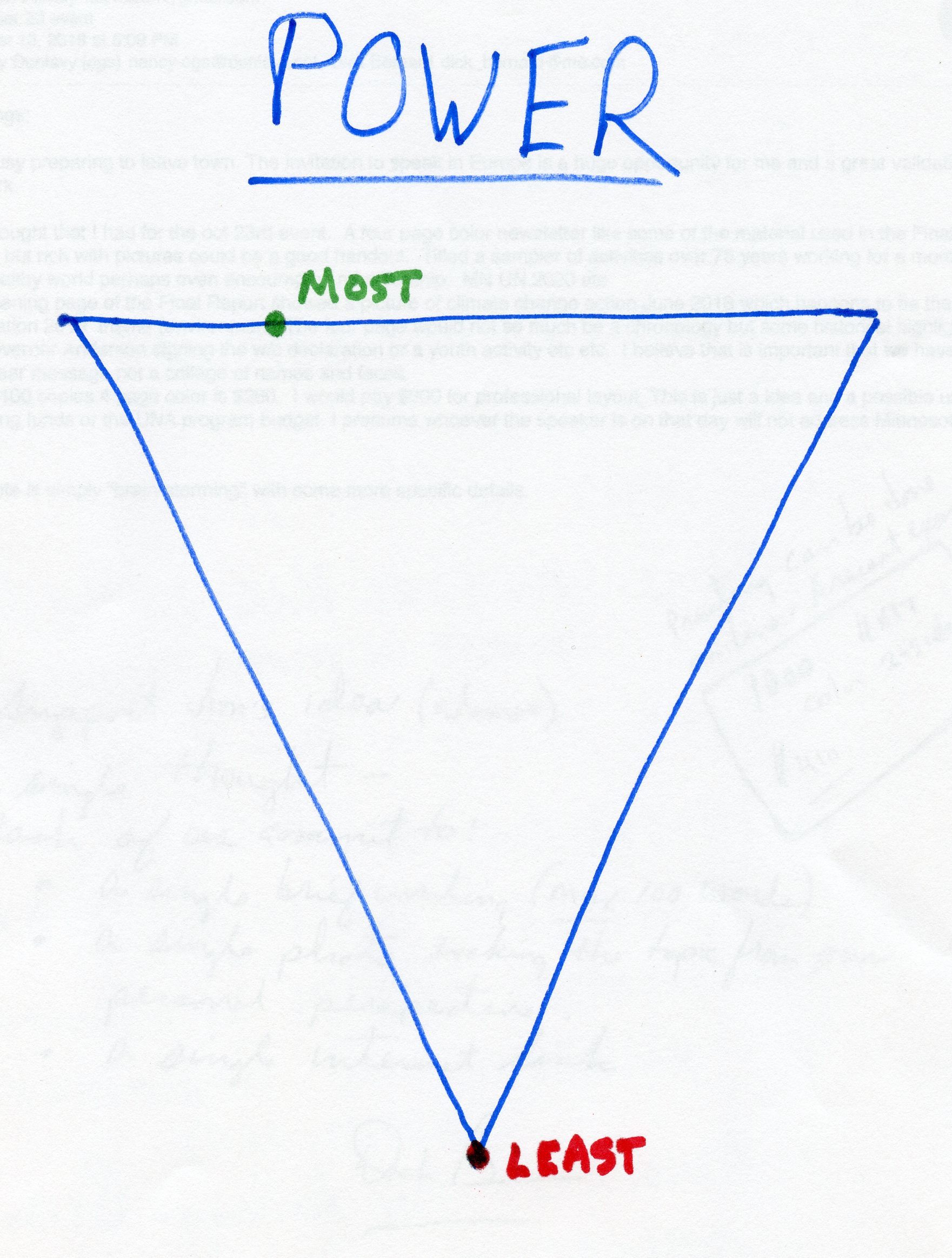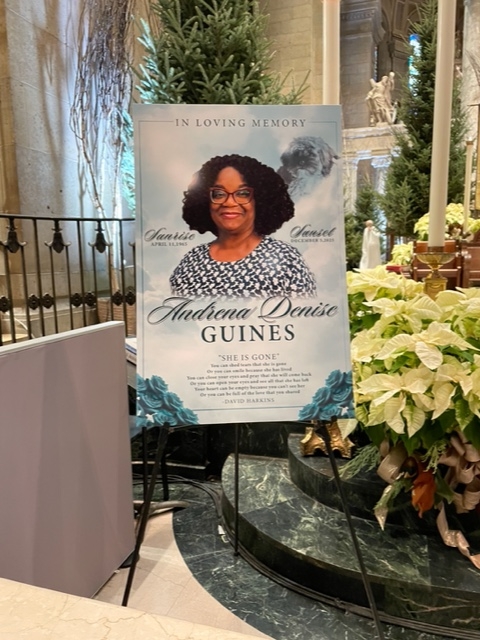PRENOTE: My post about our Precinct Caucus February 3, here
This is being written on Saturday of Super Bowl weekend, almost a sacred day for many in the U.S. I need to admit that I don’t know which teams are playing in the Super Bowl this year, or where it is being played, but by the time of kickoff I’ll probably watch for awhile, try to catch Bad Bunny (first time I’ve heard/seen him) at half-time, no interest in the commercials….
It does seem to be a good time to muse about Immigrants, since its constantly on the front page here in the Twin Cities of ICE, including half of the front page of this morning’s paper: “ONE MONTH IN MINNESOTA” continued pp A4-9 and about the month of January; “Resisting or obstructing? Line is blurry“; “5-year-old’s deportation on fast track“. Pages A 3,8, 12&13 (opinion) are almost 100% on the topic of the horror of ICE in the Twin Cities.
Feb. 5, a lady came in the coffee shop with a novel and effective approach to keeping the Twin Cities protest alive (yes there is a head on the other side of the hood!):
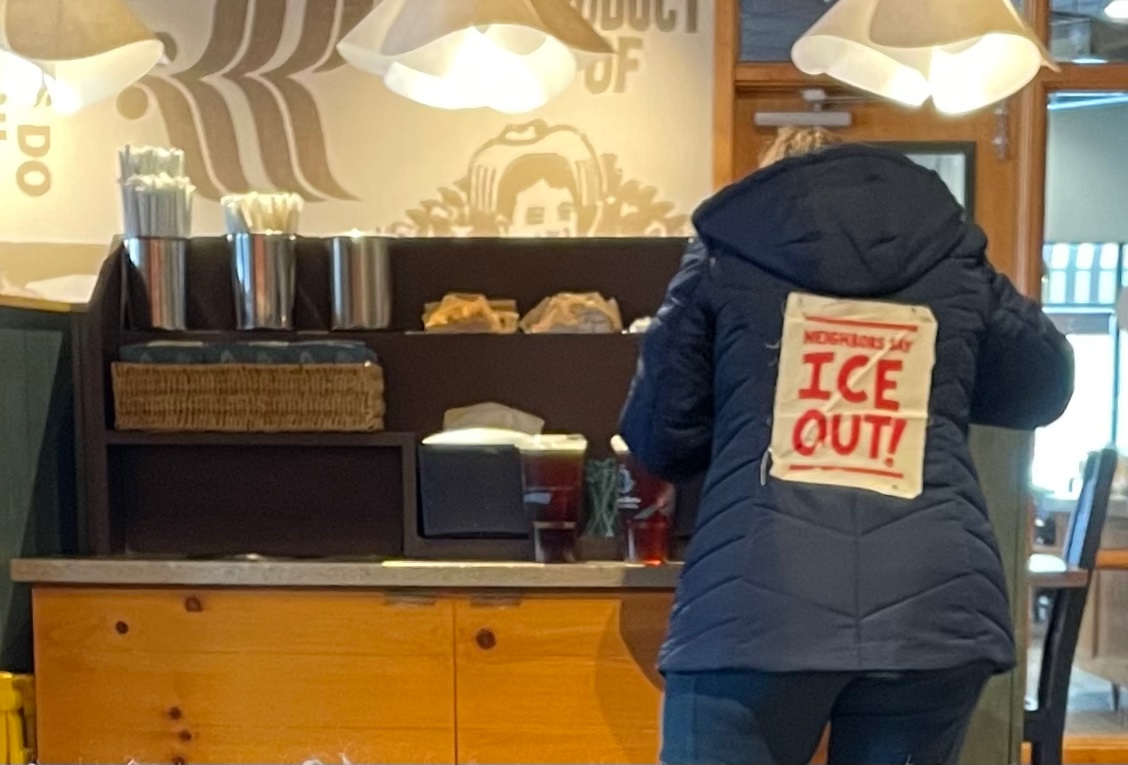
Feb. 5, 2026 Woodbury MN
This morning came this from Carol (I trust her sourcing, but don’t have it yet): “The mass deportation is projected to cost the federal government between $315 billion and nearly $1 trillion over the next decade. Under 2025 legislative proposals, the annual cost to deport one million people annually is estimated to be roughly $88 billion per year. Experts estimate an average cost of roughly $70,000 per person to arrest, detain, process, and remove undocumented immigrants. In 2023, immigrants in the United States—including both documented and undocumented individuals—paid a total of nearly $652 billion in federal, state, and local taxes. Social Security/Medicare: They have contributed over a quarter of a trillion dollars to these programs.”
Here’s a related article on the topic from the National Immigration Law Center. And another from the American Immigration Council.
*
This morning immigrants are closer to my mind than usual because of a recent and unexpected dusting off of my own family history – specifically the German side (50% of me). It came via an e-mail from Texas from the great-great granddaughter of the man who was my great grandfathers brother. I have only very recently become acquainted with her. Her John, my Wilhelm, their brother Herman, and their father and stepmother, Bernard and Maria Anna, came to America in 1872 and 1873. At time of migration the brothers were all in their 20s, born between 1846 and 1852. Their Dad was born in 1816; their birth Mom had died in 1857.
These were not tourists on luxury liners. Their migration stories would match any other voluntary migration stories from any time from any place. They came from modest circumstances. America represented opportunity and big risks. They settled in a place where people were basically like them, in language, culture and religion. No different than other voluntary migrants at any time in history, including today. People with their own stories.
My newly discovered relative and I have worked on our respective family stories for many years. and early indications are that it is a fortuitous find for both of us. (Her Dad, from Illinois, who I’ve met only one time in person, started on his family quest about the same time as I did – in 1981. And he introduced the two of us. This is how this business often works. Sometimes it takes many years, but you need to prepare for this possibility.)
(My other ‘side’ – I’m 50% French-Canadian – has similar stories to my German kin, albeit longer in North America – the first arriving in 1618 to what is now Quebec, the last to Quebec from France in 1757. Thence to what is the United States beginning in the 1840s and 50s.)
*
I, indeed most all of us in this country, are descendants of immigrants from somewhere. The only difference is the circumstance of their arrival on our shores. Of course, before all of them were the indigenous people called “Indians”, one of whom was the mother of my first ancestor born in North America.
We need to pay very, very close attention to the catastrophe now under way in this country. Our legacy as a country was built by immigrants from everywhere. There are endless stories. Take time to learn your own.
from Brian in Massachusetts Jan 26, 2026:
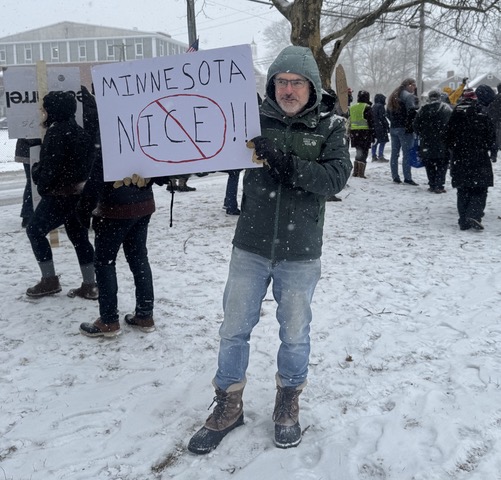
Brian in MA Jan 26 2026
POSTNOTE: One of the many immigrant groups kicked around by DJT and company was the Haitian Community of Springfield OH. Recently, Tim Snyder, a native of Springfield, wrote two posts about the Springfield situation. They are accessible here and well worth your time.
Personally, I had the privilege, twice, of visiting Haiti on study trips in 2003 (right before the coup) and 2006, meeting with and seeing people and places of Haiti and Haitians. Brian, pictured above, is a long time advocate for justice in Haiti.
My personal Haiti website, which has been on-line for years, is still available to browse if you wish. I’d personally recommend my Open Letter to U.S policy leaders in April 2006. It was my small effort to get some sense of policy problems relating to the relationship between U.S. and Haiti going back for their entire history as independent countries.
ALSO, recently I received two excellent writings on present day sources of information. The first, “Twitter is not real life”, can be accessed here. The second is “How to tell you’re being manipulated by a story”
COMMENTS (more at end):
from Joyce: [We] have been in Spain all week, on a Road Scholar tour of Andalusia. It’s 2:40AM as I write this, about to leave for the airport and home. We’ve had bizarre weather, heavy rain all week in a region that’s usually sunny and dry, thanks to an atmospheric river. My point in writing this is to let you know that everyone we’ve spoken with this week, the 18 other people from all over the US and Canada who are on the tour with us, the Spanish people with whom we have spoken, all expressed admiration for Minnesota’s standing up for immigrants. The world is with us.
from Brian: Great post–thanks! That’s why I call them ICE holes
from Ruth: Not watching the Super Bowl. I am watching the Olympics. Canadians are boycotting US. Saw Lyndsay Vaughan taken off the ski hill. Very sad to see a great athlete go down. Like to see the world come together for a good cause. Best wishes to the protesters in Minnesota. We are with you in spirit.
responding to Ruth: My bad! I hadn’t even thought about the Olympics, but we’ve already had it on, and know about Lyndsay’s mishap. Don’t know any details, but my guess is her career is now ended. I guess my personal excuse about winter sports is that when I was in 7th grade, I was wearing my Dad’s speed skates (size 13 or something), which didn’t enhance my ability to keep my feet during a kids ‘crack the pit’ on the school yard ice pond. Ended up breaking my leg. And lost my enthusiasm for skating, period. There was no way I could get myself into those skates such that I could skate. I was probably size 8….
from SAK, Feb 14, 2026:
Thanks for that post & for mentioning Lincoln, he can’t be mentioned too often. The world needs a constant reminder! A war was fought mainly over the issue of race & exclusion.
Your post as well a couple of other things brought the issues of racism, anti-immigrants & misogyny to mind.
- I listened again to an old programme about the American Populists, a political party that gained popularity in the late 19th & early 20thcentury. [This is] highly recommended!
To fight the populists, who were more liberal & egalitarian – no comparison with today’s oft called “populists”, the usual tactics were used: divide the poor farmers (white vs black) & limit their voting rights via various laws & restrictions. The Jim Crow Laws were setup mainly in the south to impose segregation thus helping division – people are unlikely to work together politically if they can’t even meet! The poor white farmer had to choose between voting along with black farmers for their mutual benefit or voting “against” the black farmer & thus feeling superior just due to the distinction of being white. Thus Thomas E Watson said: “You are kept apart that you may be separately fleeced of your earnings. You are made to hate each other because upon that hatred is rested the keystone of the arch of financial despotism which enslaves you both. You are deceived and blinded that you may not see how this race antagonism perpetuates a monetary system which beggars both.” Plus ça change . . .
- As the article below shows, the fight is never done & dusted – it has to be fought again & again. Complacency allows backward slipping & sliding. Is that what happened in the early 21st century & resulted in the present predicament? Are new Jim Crow laws being proposed & instituted?
- Elon Musk posted about race almost every day in the past January & the posts were “indiscernible from those of white supremacists” say experts.
- A British billionaire, Sir Jim Ratcliffe, has caused an almighty commotion by declaring totally wrong figures about immigration & saying the UK is being “colonized” (with an ‘s’ not a ‘z’ in the UK!) by immigrants. He is mentioned in the article below but just to note that he is one of the richest people in the UK, was part of the Brexit campaign to leave the EU, a campaign Trump & Musk favoured. Once the Leave campaign won, Sir Ratcliffe up & left for Monaco to avoid paying taxes. It is not inappropriate to say, as one journalist & broadcaster put it: “I have a hunch more Brits would say they prefer people, immigrants or not, who pay their taxes, rather than billionaires who bugger off to Monaco and don’t”. Another article highlights how Sir Ratcliffe benefits from the UK system which educated him & subsidised his business as well as topping up his employees’ livelihoods because they receive basic salaries etc.
- The shocking videoclip Trump posted of the Obamas & did not even explicitly apologise!
Trump, Musk and now UK billionaire Jim Ratcliffe – they are the enablers, making racists feel great again
With their profile and vile words, these malign provocateurs are tearing down decency’s guardrails
Fri 13 Feb 2026 Jonathan Freedland
It lacks the elegance of “greed is good”, but as a distillation of the spirit of the age, it’s right up there. “I feel liberated,” a top banker told the Financial Times shortly after Donald Trump’s victory in the 2024 US presidential election. “We can say ‘retard’ and ‘pussy’ without the fear of getting cancelled … it’s a new dawn.”
So that’s what they meant by “vibe shift”. Though, as the Epstein files reveal daily, the top 0.01% were hardly primly biting their tongues before Trump’s win, at least not in private. Those with telephone-number fortunes and great power felt able to speak, and write, to each other about women in language so vicious, so filled with hate – women discussed as body parts, as “less than human”, in Gordon Brown’s apt phrase – that they didn’t need the encouragement of a “grab ’em by the pussy” president to cast off their inhibitions.
Still, as that unnamed banker made clear to the FT, women are not the only group the powerful and privileged have been itching to disparage. This week it was migrants who were the target, accused by the billionaire Monaco resident Sir Jim Ratcliffe of having “colonised” Britain.
He may have got his stats wrong – he was in quite a muddle about the size of the UK population – but he did usefully debunk one stubbornly persistent assumption. For a while, it was taken as read that anti-immigrant sentiment was a function of economic anxiety: indeed, that was the instant explanation offered for Trump’s victory in 2016. But Ratcliffe, whose fortune is estimated at £17bn, won’t be feeling too much angst in the economic department. That is truer still of Elon Musk, who is simultaneously the backer of anti-immigration parties across Europe and the world’s richest man.
Indeed, the data shows no correlation at all between hostility to immigration and income. In January, Ipsos found that it was the most affluent fifth of voters in Britain who, more than any other group, named immigration as their most pressing concern.
The increasingly uninhibited musings of the super-rich are, alas, just one factor in a shift that is becoming ever more apparent. While of course we must say that Sir Jim’s comments did not specify the racial origins of immigrants, that’s inevitably how they were heard. We are, in the words of Sunder Katwala, who as the director of the British Future thinktank observes these trends more keenly than most, “going backwards on racism”.
The evidence is all around you. It’s there in the 116,000 hate crimes recorded by police in England and Wales, but excluding London, for the year to March 2025 – up on the previous year, and a fifth of it involving violence.
It’s there in the “ugly”, 1970s-style racism directed at NHS staff, incidents of verbal and physical abuse based on skin colour so frequent that the health secretary, Wes Streeting, warned last November that it was becoming “socially acceptable to be racist”.
It’s there in a changed public discourse, where the bounds of acceptability have shifted to include notions that most thought had been left behind two generations ago. Suddenly there’s a debate, drawing in mainstream commentators, over whether Rishi Sunak is English. A former cabinet minister, Robert Jenrick, can lament not seeing “another white face” in a Birmingham neighbourhood. A former prime minister, Liz Truss, appears as a guest on an online show where she chats with Connor Tomlinson, who believes, among other things, that British citizens from ethnic minorities should not be allowed to become members of parliament. The Sun’s Harry Cole hosts that same far-right figure on his online show.
It’s there on social media, where it has become routine to hurl the P-word [Paki for Pakistani] at politicians from the Tories’ Priti Patel to Labour’s Shabana Mahmood, from onetime Corbynite Zarah Sultana to Reform’s Zia Yusuf. And it’s there in the daily, lived experience of Britain’s minorities, measurable in both data and anecdote. Figures released this week, for example, showed yet another rise in antisemitic incidents, including a spike straight after October’s deadly attack on a synagogue in Heaton Park, Manchester, which left two dead on Yom Kippur, the holiest day of the Jewish calendar – more than half of that spike made up of incidents directly referring to, or celebrating, the killings at Heaton Park. Last autumn, Katwala wrote: “I personally get so much more racist abuse most weeks in 2025 than I ever did in 2005.”
Of course, there will be multiple and varied explanations for all this, but there are a few common threads. When it comes to the discourse, the shaping effect of online influencers is unmistakable. The likes of Tomlinson would once have been handing out badly stencilled leaflets in pub backrooms. Now he can reach millions, with TV production values previously the exclusive preserve of the major broadcasters. But the medium affects the message.
Put simply, the loudmouths of the far right are competing in an attention economy. Saying something shocking wins attention, but to keep it they have to say something more shocking still. There is a ratchet effect, which ensures the conversation becomes ever more extreme. Note the latest effusion from the white supremacist US influencer Nick Fuentes. Holocaust denial worked for him for a while, but his audience demands more. This week, he provided it by directing his fire at women, whom he castigated for encouraging sympathy for the poor and minorities. “The number one political enemy in America is women,” he told his audience on the Rumble platform. And so, “Every woman and girl is sent to the gulags. We will determine who the good ones are after the fact.” But first, to the gulags. “They go to the breeding gulags.”
These figures should be far beyond the fringe, but they keep getting amplified. Tucker Carlson hosted Fuentes on his show; Musk regularly promotes some of Britain’s most extreme voices, including Advance UK, a political party that now includes Tommy Robinson and that vows to ban indefinite leave to remain, ban the foreign-born from becoming British citizens and encourage all settled migrants to leave. Musk seems to think Advance is the real deal, preferable to the “weak sauce” of Nigel Farage. All the while, his X platform barely stirs as users racially abuse others, in the foulest language.
Throw in the brain-boiling effect of the pandemic period, when a small, extremely online minority became radicalised by conspiracy theories of every flavour, with anti-vax talk as the gateway drug, and you have some of the causes of this retrograde shift.
It’s important to hold on to the fact that most people do not think this way, that attitudes of tolerance are now deeply embedded in Britain: the data shows that too. Still, that led too many to become complacent, to assume that this was a problem of our past, one that we’d solved. But racism and prejudice are not like that. The battles against them have to be fought, and re-fought, in every generation. They are light sleepers – and some loud, powerful voices are determined to shake them awake.
